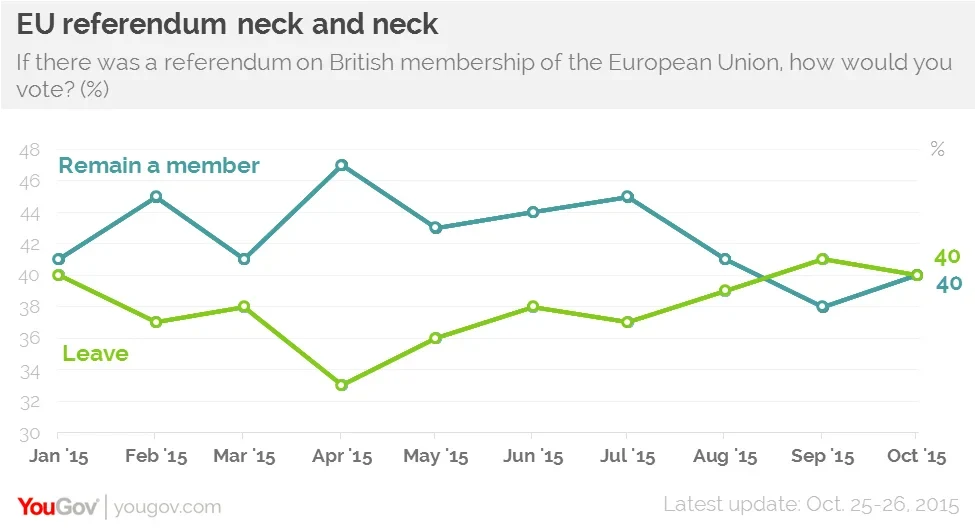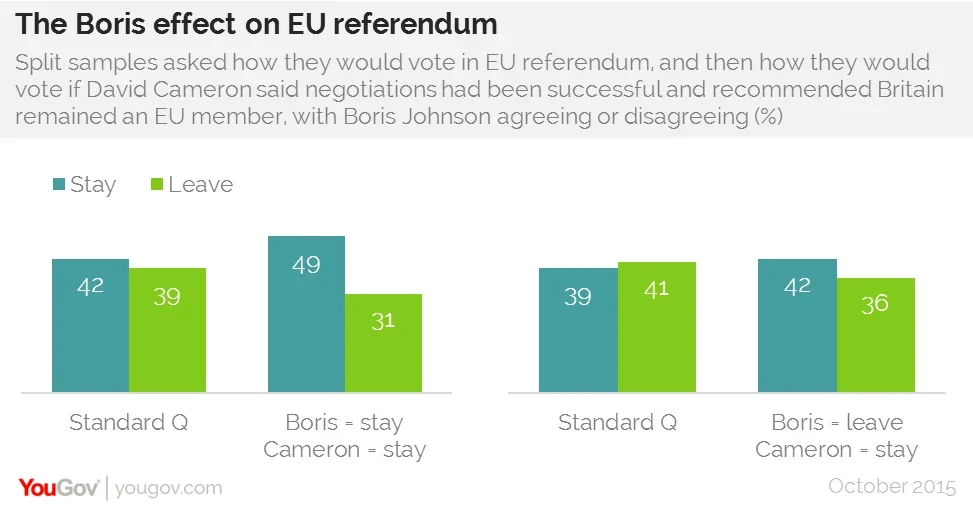The fundamentals favour a vote to stay in the EU – but campaign dramas and crises in the EU could easily make the status quo less appealing
Leaving aside California and Switzerland, which delegate large numbers of political decisions to their voters, most referendums around the world concern constitutional change. And the results of most of these turn on essentially the same question: which is the safer option – to change our arrangements or to keep things as they are? Our coming referendum on the European Union looks like fitting this pattern exactly.
If it does, then the latest YouGov survey for Prospect suggests that the fundamentals favour a vote to stay in the EU, but that the incidentals – the possible eruption of events and campaign dramas – have a real chance of changing the outcome. And one that should give the pro-Europeans real concern is the stance that Boris Johnson finally decides to take.
For the first half of this year, YouGov found a modest but consistent lead of 6-12 points for remaining in the EU. Then came Greece’s latest financial woes, followed swiftly by the refugee crisis. Since August, the two sides have been neck-and-neck.

However, when we ask a series of questions about the prospects of Britain outside the EU, a rather different picture emerges. We tend to think that Britain would be worse off, that we would have less influence in the world and that Brexit would be bad for jobs and employment. Overall, 56% of us think that Britain would be taking a risk with its future prosperity if we left the EU. Just 33% think we would be taking “not much” or “no” risk.
How do we explain the gulf between the widespread sense of risk with the neck-and-neck figures for our basic in-out question? My belief is that we are seeing something that so often happens in referendums round the world. Months before the vote, many people express their dislike of the current state of affairs and like the general idea of change. But as decision day draws close, more and more voters think about the alternative, and shy away. Some voters respond to a poll some months out like a one-night stand in a rocky marriage; the referendum itself poses a much tougher choice: whether to sue for divorce.
There are plenty of examples of the status quo gaining ground, especially in the final days of a referendum campaign – when Spain decided not to leave Nato in 1986, when Australia decided to keep the Queen as head of state in 1999, when Quebec voted twice to remain part of Canada, when France and Holland rejected the new EU constitution a decade ago, when support for Scottish devolution slumped at the end of the 1979 referendum – and, indeed, in the last few days of Scotland’s independence campaign last year. The counter examples of solid votes for change tend to come when a consensus for reform has clearly been established, and the referendum essentially legitimises that decision. Scotland’s devolution referendum in 1997 is a clear example. Plainly our coming vote on the EU is to resolve a national division, not to ratify a consensus.
So, all else being equal, I would expect a reasonably clear vote to remain in the EU, not least because YouGov surveys have shown repeatedly that at least two million Conservatives who currently favour Brexit say they would switch sides if David Cameron, as now seems almost certain, campaigns for continued British membership.
And yet, and yet. Our surveys also contain clear warning signs that an “in” vote cannot be taken for granted.
- Many voters are either uncertain about the effects of Brexit or think it will make little difference. When we ask people whether they personally would be better or worse off if Britain were outside the EU, 58% say either “no difference” (40%) or “don’t know” (18%). Such figures suggest that neither side has yet established a clear lead on this issue; it could go either way.

- Although 56% think that Britain would be taking a risk if we left the EU, that figure is down from 64% in June. The two big EU-related news stories since then – the Greek bail-out drama and the refugee crisis – have plainly had a significant impact. If this trend continues, the risks of Brexit might not exert as big an influence on the referendum as seemed likely earlier this year.
- While Cameron looks certain to campaign for an “in” vote, Boris Johnson has yet to show his hand. This month’s YouGov/Prospect research shows that if Boris campaigns for Brexit, this could severely weaken the Cameron effect. In one survey we asked people how they would vote if both men campaigned for Britain to stay in the EU. The effect was to life the pro-EU majority from three points to 18 – a 15-point bounce. But when we asked a separate sample how they would vote if Cameron wanted “in” and Boris wanted “out”, the bounce was half as much – just eight points. At this stage such numbers can be no more than indicative. But they remain telling. If Cameron and Boris both campaign for an “in” vote, Conservatives say they would vote the same way by 51-31%; but if the two men end up on opposite sides, Tories then say they would vote 41-38% for Brexit.

Suppose some kind of crisis erupts in the last two or three weeks of the campaign, over refugees, the stability of the eurozone, or whatever. I find it hard to imagine anything boosting British support for the EU – and easy to see how people might find the status quo not nearly as appealing. In that case the dangers of Brexit might well look far less frightening, and we might vote to end our 43 year marriage with our neighbours across the Channel.
PA image










